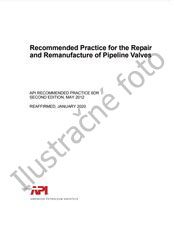Potrebujeme váš súhlas na využitie jednotlivých dát, aby sa vám okrem iného mohli ukazovať informácie týkajúce sa vašich záujmov. Súhlas udelíte kliknutím na tlačidlo „OK“.

API TR 934-FPART1-ed.1
Impact of Hydrogen Embrittlement on Minimum Pressurization Temperature for Thick-wall Cr-Mo Steel Reactors in High-pressure H2 Service-Initial Technical Basis for RP 934-F
NORMA vydaná dňa 1.9.2017
Informácie o norme:
Označenie normy: API TR 934-FPART1-ed.1
Dátum vydania normy: 1.9.2017
Kód tovaru: NS-1140759
Počet strán: 119
Približná hmotnosť: 388 g (0.86 libier)
Krajina: Americká technická norma
Kategória: Technické normy API
Anotácia textu normy API TR 934-FPART1-ed.1 :
API TR 934-F PART 1, 1st Edition, September 2017 - Impact of Hydrogen Embrittlement on Minimum Pressurization Temperature for Thick-wall Cr-Mo Steel Reactors in High-pressure H2 Service-Initial Technical Basis for RP 934-F
OBJECTIVE AND SCOPE
The objective of this study in support of API 934-F is to document and further develop the technical basis for establishing a MPT necessary to control hydrogen embrittlement of weld metal and base plate of 21Cr-1Mo steel used in petrochemical reactor applications. The dependencies of this MPT on dissolved hydrogen concentration and steel purity/temper embrittlement are particularly important to pressure vessel safe operations and will be defined. A secondary objective is to improve the underlying data base for REACT-type fracture mechanics FFS modeling of IHAC.
The approach of this investigation centered on five tasks designed to:
- 1) Summarize and clarify the science-based analysis of H accumulation at the crack tip put forth in Dr. Al- Rumaih’s PhD dissertation and confirm the assumptions, input data, and modeling results used in this Phase II JIP research [2]. The aim of this work, centered on moderate-impurity 21Cr-1Mo steel, is to quantitatively establish the H concentration–temperature dependence of the threshold for IHAC in Phase I standard laboratory specimens (KIH), as a foundation to predict MPT and conduct fitness-forhydrogen- service analyses.
- 2) Validate the Phase II correlation of KIH and critical temperature vs H concentration based on new analysis of post-Phase-II laboratory data obtained to describe IHAC of moderate-purity 21Cr-1Mo steel using ultra-thick compact tension specimens.
- 3) Enhance the Phase II analysis of KIH vs crack tip H concentration, and thus MPT, by describing the interaction between temper embrittlement and IHAC using JIP Phase I data so as to predict the influence of modern steel purity.
- 4) Build on the hydrogen-damage-mechanism-based master correlation between KIH and crack tip stress field/microstructure-trapped H to develop a H concentration similitude parameter that is useful in engineering analysis of thick-wall reactor FFS and MPT.
- 5) Validate the empirically based trends and predictions of the effects of temperature and steel purity on the threshold stress intensity through consideration of the state-of-the art theory and micromechanical modeling of IHAC.
This analysis is limited to a KIH-based approach to describe the onset of subcritical IHAC. In this context the MPT is based on the steel temperature above which KIH for a given bulk H concentration approaches KIC for hydrogen-free steel. Prediction of subcritical IHAC damage accumulation, and residual vessel life, based on crack growth rates and crack extension at temperatures below the MPT, is not considered. Possible enhancement of unstable or tearing fracture due to dissolved H is not considered. The former assumption is dictated by the complexity of a crack-growth-rate-based inspection interval approach, best considered after a KIH-based MPT strategy is developed. The latter assumption is justified base on the limited and weak data base, as well as fundamental understanding, for H reduction of KIC to KIC-H as well as reduced R-curve resistance to stable tearing.
Odporúčame:
Aktualizácia technických noriem
Chcete mať istotu, že používate len platné technické normy?
Ponúkame Vám riešenie, ktoré Vám zaistí mesačný prehľad o aktuálnosti noriem, ktoré používate.
Chcete vedieť viac informácií ? Pozrite sa na túto stránku.



 Cookies
Cookies
